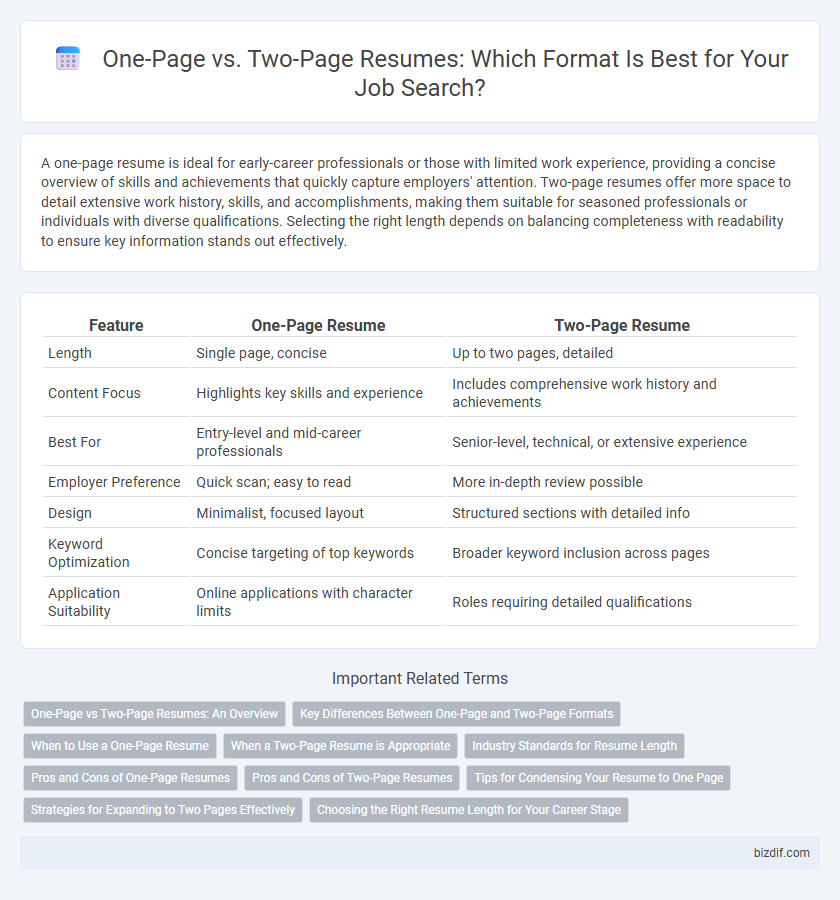A one-page resume is ideal for early-career professionals or those with limited work experience, providing a concise overview of skills and achievements that quickly capture employers' attention. Two-page resumes offer more space to detail extensive work history, skills, and accomplishments, making them suitable for seasoned professionals or individuals with diverse qualifications. Selecting the right length depends on balancing completeness with readability to ensure key information stands out effectively.
Table of Comparison
| Feature | One-Page Resume | Two-Page Resume |
|---|---|---|
| Length | Single page, concise | Up to two pages, detailed |
| Content Focus | Highlights key skills and experience | Includes comprehensive work history and achievements |
| Best For | Entry-level and mid-career professionals | Senior-level, technical, or extensive experience |
| Employer Preference | Quick scan; easy to read | More in-depth review possible |
| Design | Minimalist, focused layout | Structured sections with detailed info |
| Keyword Optimization | Concise targeting of top keywords | Broader keyword inclusion across pages |
| Application Suitability | Online applications with character limits | Roles requiring detailed qualifications |
One-Page vs Two-Page Resumes: An Overview
One-page resumes emphasize concise, relevant information tailored to the specific job, ideal for entry-level candidates or professionals with fewer than 10 years of experience. Two-page resumes allow for a more detailed presentation of skills, achievements, and work history, suitable for those with extensive experience or multiple relevant roles. Selecting the appropriate length depends on industry standards and the candidate's career complexity, ensuring clarity and impact.
Key Differences Between One-Page and Two-Page Formats
One-page resumes emphasize concise presentation of key skills and experiences, ideal for early-career professionals or job seekers with limited work history. Two-page resumes allow for a more detailed overview, accommodating extensive experience, multiple roles, and comprehensive achievements. The choice between formats depends on the depth of relevant information and employer expectations within the industry.
When to Use a One-Page Resume
A one-page resume is ideal for recent graduates, professionals with less than 10 years of experience, or those changing careers to highlight key skills and relevant accomplishments concisely. Recruiters often prefer one-page resumes for quick screening, ensuring essential information is easily accessible without overwhelming details. Emphasizing clarity and brevity in a one-page format can increase the chances of passing Applicant Tracking Systems (ATS) and capturing hiring managers' attention efficiently.
When a Two-Page Resume is Appropriate
A two-page resume is appropriate for professionals with extensive experience, typically over 10 years, or those with multiple relevant roles, certifications, and accomplishments that cannot be effectively summarized on one page. Executives, managers, and specialized professionals in fields such as IT, engineering, and academia often benefit from two pages to showcase their expertise and detailed project histories. Recruiters expect a longer resume when the candidate's background requires more comprehensive presentation to highlight leadership, technical skills, and key achievements.
Industry Standards for Resume Length
Industry standards for resume length vary by experience level and profession, with one-page resumes preferred for entry-level candidates and two-page resumes acceptable for professionals with over 10 years of experience or extensive accomplishments. Recruiters typically spend an average of six seconds reviewing a resume, so concise, relevant information prioritized within one or two pages enhances readability and impact. Specific industries like finance and consulting often favor succinct one-page formats, while academia and technical fields may accommodate longer, two-page documents to detail skills and achievements comprehensively.
Pros and Cons of One-Page Resumes
One-page resumes provide a concise format, making it easier for recruiters to quickly scan and identify key qualifications, which increases the chances of securing initial interviews. However, they may limit the ability to detail extensive work experience, skills, and achievements, potentially underselling candidates with comprehensive backgrounds. While ideal for entry-level applicants or those with less experience, one-page resumes might not suit senior professionals seeking to showcase diverse roles or accomplishments.
Pros and Cons of Two-Page Resumes
Two-page resumes provide ample space to detail extensive work experience, skills, and accomplishments, making them ideal for professionals with over 10 years in their field. They allow for a comprehensive presentation of achievements, projects, and leadership roles, which can better demonstrate qualifications for senior positions. However, longer resumes risk overwhelming recruiters and may be skimmed or discarded if not well-organized and concise.
Tips for Condensing Your Resume to One Page
Focus on prioritizing relevant experience and skills by tailoring your resume to the specific job description, removing outdated or irrelevant information. Use concise bullet points with strong action verbs and quantifiable achievements to maximize impact within limited space. Opt for a clean, readable layout with standard fonts and adequate white space to ensure clarity and professionalism on one page.
Strategies for Expanding to Two Pages Effectively
Expanding a resume to two pages effectively involves prioritizing relevant achievements and incorporating detailed quantifiable results to demonstrate value. Use clear section headings like Professional Experience and Skills to organize content while maintaining readability through concise bullet points and consistent formatting. Tailor the extended resume to specific job requirements, highlighting leadership roles or projects that showcase expertise without diluting focus or overwhelming the reader.
Choosing the Right Resume Length for Your Career Stage
Choosing the right resume length depends largely on your career stage and professional experience. Early-career professionals with less than 10 years of experience typically benefit from a one-page resume to highlight relevant skills and education concisely. Mid-level to senior professionals with extensive experience and multiple accomplishments should use a two-page resume to effectively showcase their career trajectory and achievements.
One-Page vs Two-Page Infographic

 bizdif.com
bizdif.com